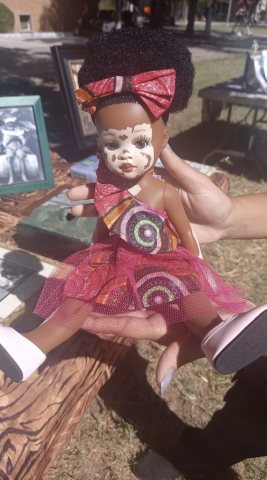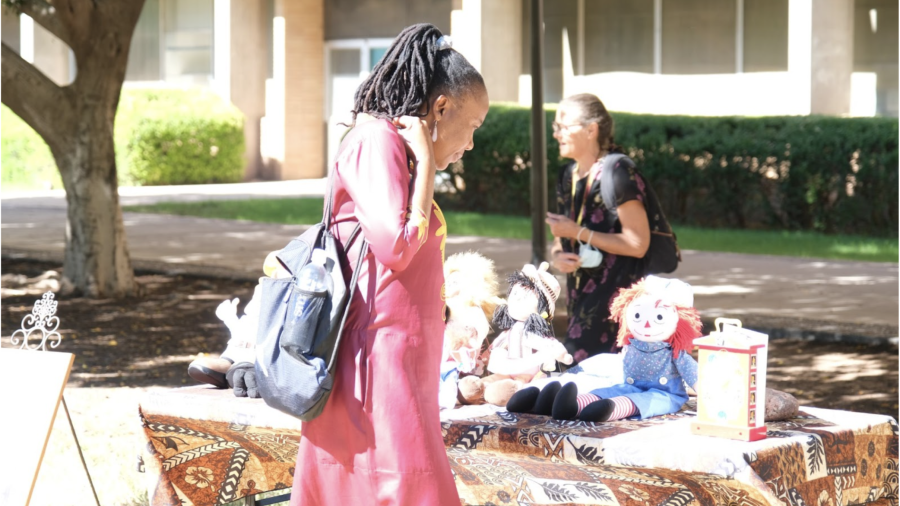Books are not the only way to understand and access Truth. On October 18, Project Humanities held an interactive outdoor exhibition to illustrate this notion, where Project Humanities Founding Director Dr. Neal A. Lester explained how and why artifacts are just as important tools of social justice as are books. Among the many attendees was Mojwadi Gosiame, a visiting Fulbright Distinguished International teacher, who was deeply moved by the eclectic arrangement, particularly by a doll of a little Black girl with Vitiligo. Gosiame reached out to Project Humanities to express how meaningful she found this event to be. The following is a written interview conducted with Gosiame after the event to gather her reflections on the power of depicting social justice through ‘things’ and ‘stuff.’
Please tell me a little bit about who you are and what you do professionally
My name is Mojwadi Gosiame, from Botswana. A wife and a mother of two boys aged 11 and 6. I am a junior secondary school Design and Technology teacher, working for the Ministry of Basic Education. Currently, I am on a Fulbright Distinguished International teachers exchange program, working on an enhancement inquiry project on DI that I should roll out in my country once I complete it here. I used to do a lot of poetry growing up, something that I gave up when I had to fend for my family. I heard a voice on the speaker, and I thought you were doing an infinite word session. I saw a poster of Bob Marley… and that is how I was drawn to the event.
Which themes and messages from the “Beyond Books” event do you feel resonated the most with you from the event?
Social justice. More so because I come from a society of “oppressed people.” A lot of ideologies are imposed on (us /me), and a lot of time, it can be so overwhelming. One can end up being detached from the reality of how life should be like.
In my late teen years, I started my undergraduate study in a field dominated by men, being in a faculty of Engineering and Technology dominated by men, a faculty that was built outside the main campus which meant I had to reside in a block dominated by men. It was the most trying time of my life as I had to go through an intense 5-year program having to prove myself worthy of being in the institution, had to prove that I was “intelligent” enough to cope with the content, “masculine” enough to carry out the practicums without seeking sympathy from my male counterparts, “feminine” enough to look attractive to my male counterparts. What with the nasty comments of “how you should dress, behave, look like, walk,” and all the other aspects that are enough to break somebody. I always said for a woman FET could either break or make. I chose not to break. I had come a long way to give in; I had to keep on for the other women following to show that we can but mostly I kept sane for myself. The wounds were there alright but eventually, they heal but the scars will always show. So, this is part of the struggle that women in marginalized communities go through, more painful in that it’s what is imposed by their people.
Our society looks down on people who are not married especially women; they are highly ignored during some of the most “important” traditional ceremonies. This has led to a trend of younger women with desperate desires to marry earlier just so they could fit in the norm of societal expectations. Still, after marriage, the same society pressures one to bear kids, how to raise them, where to raise them, the duty of a child-bearing mother, the role of a wife in a household … All those expectations imposed on women by society are bound to overwhelm a person. Women lose themselves in marriages that do not fulfill them, not their aspirations, or their dreams. That is why today’s research shows that at least 45% of married women in my country are suffering from mental conditions and going through depression.
How have your experiences with the event affected you on a personal level?
I was mostly interested in the issue of different conditions that people live with. I identified more with that of vitiligo because for me is what I am experiencing. Vitiligo is a relatively new condition in my country and a lot of people are not familiar with it. I was not also until my husband developed it. The journey for him to acceptance has been challenging, and he went through a dark path of depression because he struggled to accept he had the condition and the society around him also made it difficult for him to move on. So, it reminded me of the journey we took to where we are now, to how much we have learned about the condition now and to accept that we cannot have it cured but rather learn to live with it.
What thoughts and/or questions do you feel the event left you with in regard to representation and the ways that prejudice manifests in the physical world?
- Where do we go then as a people start to make it alright?
- What is our role in healing the wounded?
- How do we cover the scars or do we expose them to show where we have been?
- How do we protect the coming generation from inheriting this generational encounter?
Why do you think it is important to showcase, as this event was constructed to assert, that books are not the only way to access and understand the Truth?
It can be more appealing to the audience than if they could just be reading about it. It enables consultation and engagement hence more understanding of the concepts.
Why and how do you believe the event addressed conversations that have been happening in our communities both locally and globally?
The closest to addressing the conversations is what we see in movies, political rallies, and freedom squares. Now to have that openness on campus was mind-blowing. These are the types of conversations that people are afraid of having, so to be able to freely engage like it was at the event is something that I really admired.
Being a visitor here myself, with little knowledge of America [USA] from some books that I read and movies that I have watched I felt it really addressed them. It triggered a lot of memories and it hit right where it hurts because the conversations there are the kind that are not comfortable for a lot of people but for the fact that this platform allows that and it allows the outspokenness without any blurs like I said is something that I admired. It goes to prove that people, if given the right platform, have got voices and they need to be heard.
Are there any final thoughts or sentiments you would like to share?
Just to thank the organizers and the team for the good initiative. I wish it could be a movement that goes across borders to help the voiceless who are suffering in silence in the dark corners of the world.

